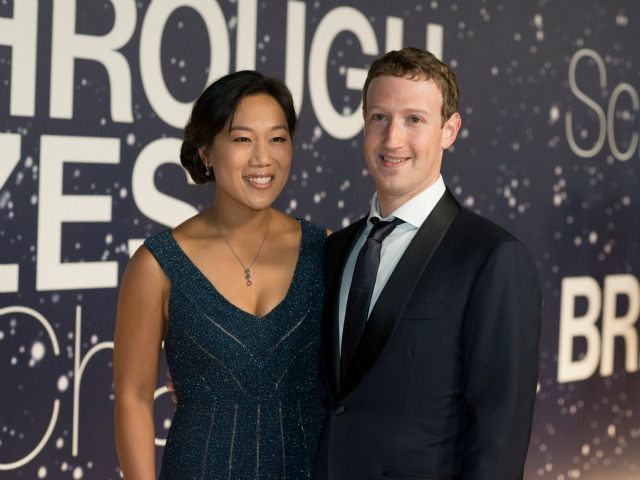Facebook Co-Founder Mark Zuckerberg and his pediatrician wife, Dr. Priscilla Chan, named the first 47 university researchers who will join their $3 billion Biohub research institute in a quest to cure all diseases.
Breitbart News reported last year that Zuckerberg generated a torrent of criticism when it was discovered that he would honoring his commitment to give away 99 percent of his wealth by bequeathing his Facebook shares to his own Limited Liability Corporation named The Chan Zuckerberg Initiative LLC, rather than forming a traditional charity.
Although Zuckerberg and Chan claimed Biohub’s initial charitable focus areas would be personalized learning, curing disease, connecting people and building strong communities, detractors argued that LLC’s are a form of corporate ownership that can do things like invest in private companies and earn money.
Given that Facebook and other Silicon Valley tech companies have used offshore tax havens to lower their supposedly “fair” tax rate down to 0.00045 percent, critics voiced the concern that the Zuckerberg-Chan duo could change their mind at any time in the future and just keep the money.
But on February 8, Zuckerberg and Chan announced that their San Francisco-based research institute will provide a total of $70 million to 47 research faculty members at the University of California San Francisco; UC Berkeley; and Stanford University. Each will receive no-strings-attached awards to focus initially on two projects: a cell atlas and infectious diseases.
Launched in September, the Biohub’s Investigator Program provides scientists and engineers with five-year grants for life sciences research averaging $300,000 per year. The awards are roughly equivalent in size to a National Institute of Health R01 grant. The main difference is that Biohub intends to fund early stage hypothesis-driven research that is very difficult to receive from NIH.
Biohub co-president and UCSF infectious disease specialist Joe DeRisi says that Biohub’s goal is not to supplement what researchers are already doing, but to allow them to explore what he calls “blue-sky” areas. That is why many Investigator Program award winners are young scientists striving to obtain grants, and only a few are slated for well-funded faculty.
To generate a sense of community, the 47 investigators will meet periodically at Biohub’s building in San Francisco’s Mission Bay district. The institute will also provide on-site labs for collaborative activities that require a lot of space. DeRisi told Science, “We are very much trying to bring in a highly disciplinary, highly collaborative approach.”
Biohub grants will require that investigators share journal submitted manuscripts online as preprints. Biohub’s leaders are still discussing whether to require all those journal articles to be freely available upon publication, similar to the Bill & Melinda Gates Foundation’s requirement for biomedical research.
Chan’s work as a pediatrician is credited with the inspiration for the project. The couple emphasized that their goal to solve all disease can be accomplished — if not in their lifetime, then in their baby daughter Max’s lifetime.

COMMENTS
Please let us know if you're having issues with commenting.